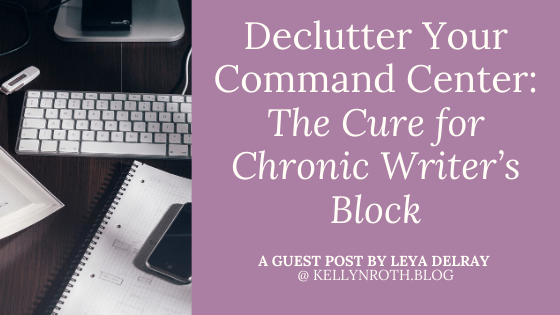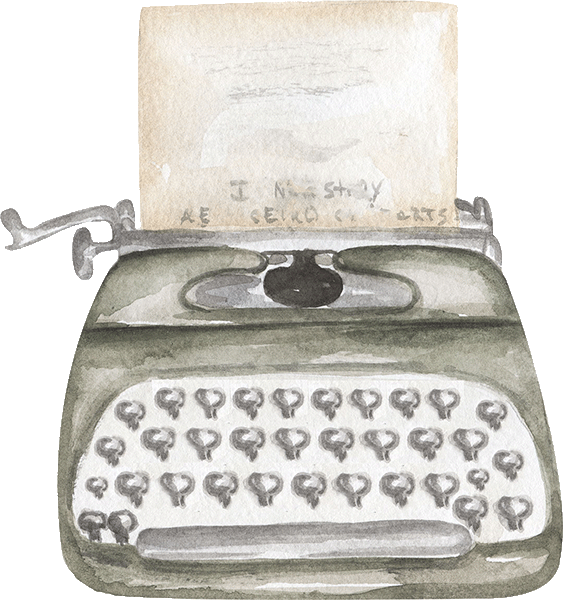
Today I’ve got an article I’m pretty excited about … a guest post by Leya Delray, author of Where Daffodils Bloom, which has always been a favorite of mine.
I love this post for two reasons:
- It indicates that Leya is WRITING, which means some day she might release another book. Yay!
- It’s very true!
So enjoy this post on chronic writer’s block & overcoming it!

Do you suffer from Chronic Writer’s Block? Did your head once overflow with explosive, fascinating story ideas that you couldn’t wait to get on paper, but now you struggle to get anything more than a faint glimmer of inspiration?
I know how it feels.
For years I wrote stories constantly, had more than I knew what to do with, and looked forward to the day I would eventually be a published author. Then I became one.
And the stories stopped coming.
 In autumn of 2018, I released my first book, Where Daffodils Bloom. It was a project that had taken over three years of intensive research, writing, and rewriting. And the final year, particularly, was crazy intense. But I was passionate about the story (which was based on the real life of a WWII war bride) and thrilled to finally see it go out to the world so that I could sit down and rest and watch it go.
In autumn of 2018, I released my first book, Where Daffodils Bloom. It was a project that had taken over three years of intensive research, writing, and rewriting. And the final year, particularly, was crazy intense. But I was passionate about the story (which was based on the real life of a WWII war bride) and thrilled to finally see it go out to the world so that I could sit down and rest and watch it go.
But as it turns out, publishing is NOT the end of the process. I quickly discovered there was a whole new slew of tasks to learn and manage. Keeping track of sales, doing book promotions, speaking engagements, taxes (bleh). But at least it worked.
I was successful. The book made money, and even became a bestseller in one of Amazon’s ten bazillion sub-categories (heh). I got lots of reviews. People loved the book (yay!). Readers who personally knew the main characters said I had captured the them perfectly (yay!). Dozens of strangers lined up waiting for me sign copies (yay!). And then they asked me what I was writing next.
Ugh.
At first I told myself I was just tired, and needed time to recover from this huge project before I tackled another one. But the weeks and months kept going by, and nothing changed. The storyteller inside had gone silent.
Oh, I had inklings, scraps of ideas, even full-blown stories left-over from before I started work on Where Daffodils Bloom. But nothing big and new and brilliant. The old ideas sat around, looking neglected, and the new ones were only faint whispers that never fully materialized.
After almost a year and a half, I knew I couldn’t blame it on being tired from the first book. I was suffering from a serious case of Chronic Writer’s Block, and I had no idea how to fix it.
Then came COVID-19. And I had my epiphany.
They say that if you want to be creative, you have to declutter your workspace. You’re not going to feel like quilting if you can’t find your ruler and rotary cutter under all the mounds of fabric; you won’t want to scrapbook if you’ve lost your scissors under piles of mutilated paper and photos; and surely no painter gets excited about painting if he has to kick his way through a pile of discarded canvases and empty paint tubes to get to the easel. So it stands to reason that if you want to be excited about writing, you need to declutter your writing space too.
And no, I don’t mean your desk.
That’s where I got it wrong. I didn’t know clutter was my problem, because I didn’t HAVE a cluttered desk. I’m a rabid organizer. I despise clutter. My whole house is (usually) so intensely organized that I can find almost any item it in under a minute. So surely I, of all people, wasn’t dealing with a clutter problem, right?
Wrong.
My mistake was in thinking that a writer’s work-space was their desk. But let’s be honest. If you’re anything like me, you don’t just write in one specific place. You might write on the couch, or in bed, or at the kitchen table, or out on the porch. You basically just need your laptop and your brain to have your writing space. And unless you have a habit of leaving post-it notes and empty mugs literally sitting on top of your keyboard, it’s pretty unlikely that your laptop is cluttered. So what does that leave?
Your brain.
Think about it. Your brain is like the command center for everything you have to do and keep up with. Your commitments, your social life, your jobs, your relationships, your hobbies and interests, they are all constantly being filed, organized, and dealt with in your brain.
Now imagine your inner self standing in the middle of that command center, dealing with all the flashing screens and paperwork and red-alert sirens when something important is overdue, and everything. All at once. If the command center is constantly running at max capacity, with multiple red lights blinking and paperwork piling up on every desk, are you going to have the time and space to think about stories? Obviously not.
My inner storyteller wasn’t just silent. She was swamped. In the year and half since I published the book, I got engaged, planned a wedding, took on several massive costume-design projects, made my own wedding dress, got married, moved an hour away from everything I was used to, found a new church, and in the midst of all that, tried to figure out how to navigate the book marketing world for the first time. I was so busy running around frantically keeping up with everything, that I didn’t even have time to identify what the problem was.
Then came a world-wide pandemic. And normal life suddenly slammed to a halt. Social commitments were canceled, costume deadlines were postponed, everybody started self-quarantining, and I got a chance to stand still and breathe again.
Turns out, that’s what I needed all along. My problem was a cluttered brain. Kind of sad it took a virus running rampant around the country to make me stop long enough to see it.
Now I want to make it clear that my deepest sympathies go out to all those whose lives have been negatively affected by this virus. I do not in any way mean to make light of anyone’s illness, shortages, or financial difficulties. But for myself, this quarantine has created a forced break in normal life has been a blessing in disguise.
It’s given me the chance to realize that my real writing space, the secret, creative space inside my head, can’t function properly if I never stand still. If the main, organizational part of my brain is like a busy command center with doors leading to all the different zones of responsibility and activity, then the creative part is like a secret garden outside, where ideas and stories germinate and grow as I wander through the trees. But if I don’t have time to wander, I won’t ever find them.
So if you are dealing with Chronic Writer’s Block, take a moment to check and see if you need to declutter your brain. When was the last time you actually had the time, inside your head, to sign off on all the paperwork and wander out of the Command Center and into that secret garden where the stories grow? Have you been there at all recently? Or did you accidentally pave over it to expand the Social Media Response Station and the Imminent Deadline Management Center?
I know that for me this has been a wake-up call. However long the quarantine lasts, I know it won’t be forever. Life will go back to normal eventually, and at some point, I’m going to need to make decisions about what “normal” is going to be. I am going to have to choose to make time for dreaming. Choose to not fill up every available space in my schedule with jobs and deadlines and social obligations. I am going to have to keep the Command Center running at non-emergency levels more often, so that I can take a break and step out into the garden now and then.
Because that’s where the stories grow.
About the Author
 Leya Delray is an author, researcher, and costume designer with a deep love of storytelling. She has also been a historical reenactor for most of her life, portraying time periods that stretch from 1700’s to WWII.
Leya Delray is an author, researcher, and costume designer with a deep love of storytelling. She has also been a historical reenactor for most of her life, portraying time periods that stretch from 1700’s to WWII.
After earning a B.A. in English from Thomas Edison State University, she channeled her passion for research, history, and storytelling into a biographical novel, Where Daffodils Bloom, based on the true story of a WWII war bride.
Delray lives with her husband in the beautiful foothills of the Appalachian mountains, surrounded by trees, history, and a yard full of daffodils. You can find out more about her on her blog: www.leyadelray.com or follow her on Facebook: facebook.com/leyadelray.author or Instagram: @leyadelray.

TTFN!
~Kellyn Roth~
P.S.
Do you agree with the author? Has this crazy time of freak-outs & overreactions made your life a bit easier, even in little ways? (It certainly has mine!) How do you deal with writer’s block?


